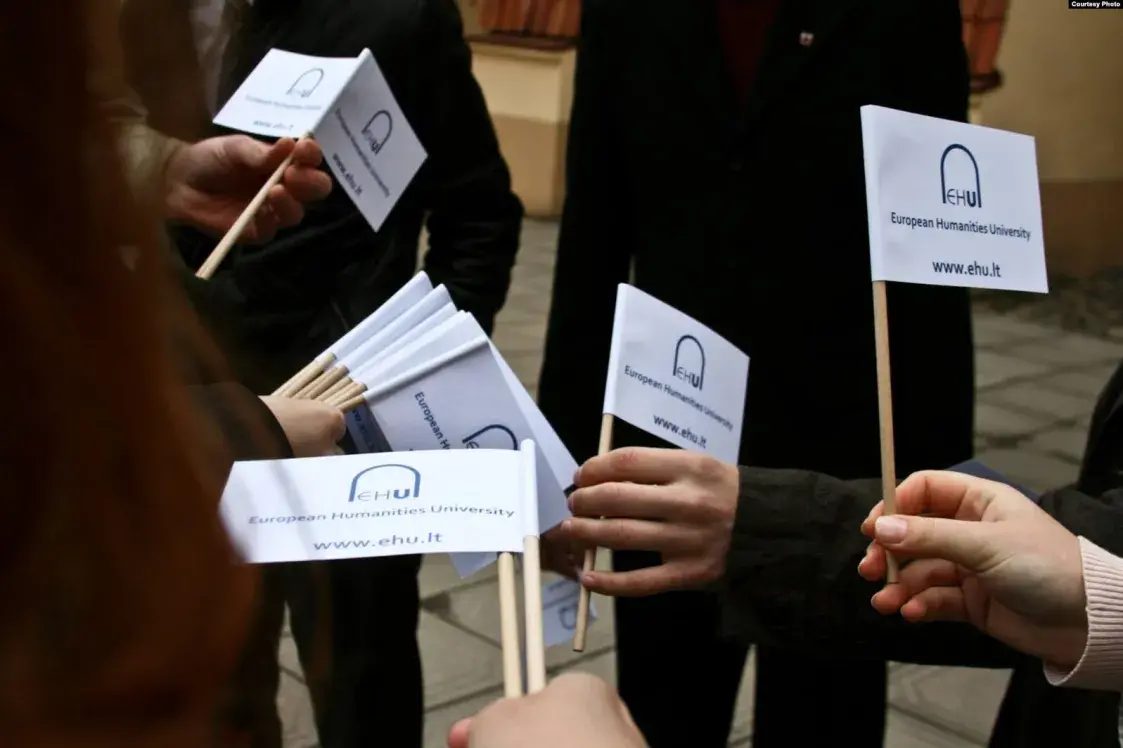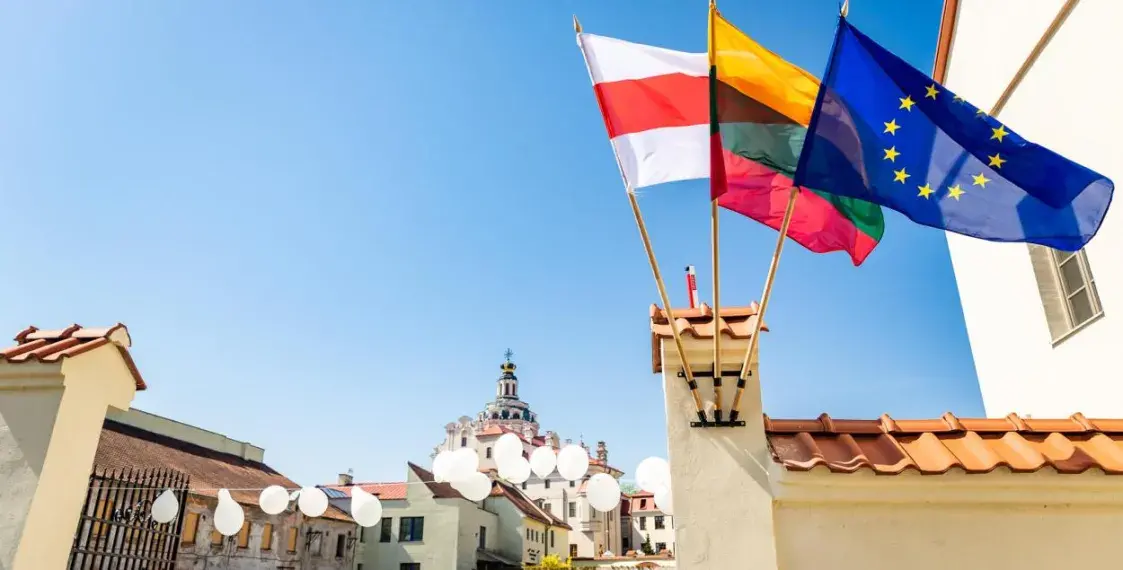Belarusians demand transparent election of EHU rector

Students / DELFI
Students, professors and other academic community members are demanding transparency in the election of EHU's new rector. The competition was announced on May 26, 2022, but there is still no open information about the number of candidates, their programs and voting dates.
Meanwhile, foreign donors continue to view EHU as an essential hub for employees and students and as one for educational initiatives by civil society as a whole. In other words, the university is becoming less of an academic institution and more of an aggregator and distributor of resources. However, what happens there is not clear to everyone.
Why aren't elections transparent, and is there anything that can be done to make them run by the rules?

"This is a significant topic for me because I worked at EHU from 1998 to 2014, and it is difficult to keep the distance now," says an expert in science, education and innovation, Andrei Laurukhin, during the roundtable "Election of EHU Rector: path dependence or a new beginning?" I know the EHU from the inside. Its history and image. It is crucial. There are problems with the latter".
Problems at EHU have been brewing for a long time
"The idea of the European Humanities University was born at a meeting of Academician Anatoly Mikhailau and Metropolitan of Minsk and Slutsk Filaret," says the educational institution's website. The two appear there, but according to Laurukhin, many staff and students remember that four people were involved in the university's founding.
"Besides those named, they are the first vice-rector of EHU, Uladzimir Dunayeu, whose contribution to the university's development is hard to overstate, and, alas, the late associate professor Valery Zalatar - a tremendous intellectual and dissident from the Soviet period. Mr. Dunayeu was fired in 2008, but we were never told why.
Thus, we see only two names out of the four founders. History is being rewritten. Unfortunately, this is a symptom in Belarus where all dissidents and undesirables are crossed out -- those who did not like something, who turned out to be in some way unpleasant to the authorities. Something similar is happening at the EHU."
Change is not for the better
To understand what is going on at the EHU today, it is essential to know how the educational institution was transformed after the move to Vilnius. Before 2004, the university operated in Minsk. During that time, it became not only one of the leading private universities, but also a competitor in several disciplines (philosophy, political science, psychology, law) to the leading university of the country - BSU.
Here's what Andrei Laurukhin recalls:
"Lukashenka once said: 'If elites are trained at the EHU, then who are we?" It was a rhetorical question and, at the same time, an acknowledgment that the EHU had become competitive and probably influential in forming political elites. EHU regularly appeared in the ratings of the first universities -- not only private, as it is now in Lithuania, but also state ones.
What happened after the EHU moved to Vilnius? Let's go over the dry statistics. Only five of the eight faculties, or departments, worked in Minsk in 2005. It was understandable then: not everyone agreed and was able to leave. But now there are only two. The number of students also almost halved. In 2005, despite the challenging conditions of the move, over 2,000 full-time and distance-learning students remained at the EHU. In 2013, there were 1,600, and now the EHU boasts a student body of 1,197. And that's a lot! Not long ago, there were fewer than a thousand of them.
Also, the EHU has almost halved the number of faculty members. In 2019-2020, there were 42. This is the only publicly available information. I have not found out how many people work in the EHU administration today."

Civil society excluded
"While for the students, the EHU is positioned as a student-centric university [not all students agree with this - Euroradio], for various international donors and civil organizations, the EHU has long been positioned as an essential element in the development of civil society in Belarus," says Yaraslau Bekish, head of the board of the international consortium EuroBelarus and co-founder of the Green Network.

"And when I hear that, I look at the situation regarding business processes and management, impact, influence and money. How consistent is the university's claim that it is a forge for civil society and a critical element of civic education? No one can answer this objectively, but we can hear many subjective versions.
My version is the following: for a long time now, there have been no representatives of civil society in the governing bodies of the EHU, excluding student formations. I've talked about this before. There are attempts at imitation. There is also no communication system - no mechanisms for any kind of synchronization with civil society have been provided so far. This is an objective fact.
Regarding business processes, it is difficult for me to judge the EHU. I can only speak based on what I hear today because I do not see transparency. The most prominent example of non-transparency is the protracted procedure for selecting a new rector. I can say that civil society is wholly excluded from this process."
Why EHU still receives funding
According to Yaraslau Bekish, the EHU does not receive funding as an academic institution but as part of programs to develop democracy and civil society.
"I am a fairly consistent critic of the architecture of these programs. Several times at different levels, including in communication with representatives of the European Commission, I have been able to discuss how and why support continues to be provided to a university that has not been evaluated in depth for its contribution to the development of civil society in very many years.
At the level of private conversations, I had an impression that the most objective answer is: "We cannot stop funding the EHU and some other projects because we have already put too much effort into it. Because it's a brand. And because we can't explain to the taxpayers of various countries that we've been funding something wrong all these years." So we see the classic economic trap: you keep funding something that doesn't pay off, just because you put a lot of money into it.

P.S. Pavel Tserashkovich, an expert of the Civic Bologna Committee, has nominated his candidacy for the position of EHU rector. According to Sviatlana Tsikhanouskaya's education representative Volha Shparaha, the candidate's support group does not give up hope that the EHU can still serve the interests of Belarusians, including those who, in 2020, risking their health and lives, took to the streets and were forced to leave or go to jail.
The Tserashkovich support group is calling on election organizers to meet their commitments to publicity, openness and transparency in the contest process and is asking other members of the democratic community to support those candidates who offer programs to reform the EHU.
Euroradio will follow developments and ask the university administration for more information about the voting deadlines, the candidates for the rector's seat and their programs.



















